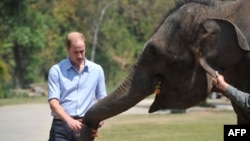Britain's Prince William urged an end to the ivory trade on Wednesday, visiting a Chinese elephant sanctuary in the southwestern province of Yunnan at the close of a three-day trip to the country that focused partly on wildlife conservation.
William has been critical of China over its consumption of ivory, while animal rights groups say the country's growing appetite for the contraband material has fueled a surge in poaching in Africa.
China announced last month a one-year ban on the import of African ivory carvings, just days ahead of William's visit.
"A powerful blow we can strike against traffickers is to reduce the demand for their products. Demand provides traffickers with their incentive. It fuels their greed, and generates their vast profits," William said in a speech released by Britain's royal household.
"Ultimately, ending demand for ivory is down to citizens across the world," William said, adding that he welcomed "the steps that China has already taken" to counter the trade.
The extinction of animals such as elephants, rhinos and pangolins would be an "immeasurable loss" to humanity, he said.
William's trip to China is the first high-level British royal visit since Queen Elizabeth and her husband, Prince Philip, came in 1986.
It follows rancor between London and Beijing over pro-democracy demonstrations last year in the former British colony of Hong Kong.
Take lead in protecting animals
William, Queen Elizabeth's grandson and second-in-line to the throne, told Chinese President Xi Jinping on Monday that he hoped China could become a leader in protecting animals.
China crushed 6.2 metric tonnes (6.83 tons) of confiscated ivory early last year in its first such public destruction of any part of its stockpile. However, the country still ranks as the world's biggest end-market for poached ivory, according to the World Wildlife Fund.
China signed a pact banning global trade in ivory in 1981, but it got an exemption in 2008 to buy 62 tonnes of ivory from several African nations. It releases a portion of that stockpile each year to government-licensed ivory carving factories.
Over 20,000 African elephants were killed for ivory in 2013, a Convention on International Trade in Endangered Species monitoring program showed, leaving a population believed to be around 500,000.





